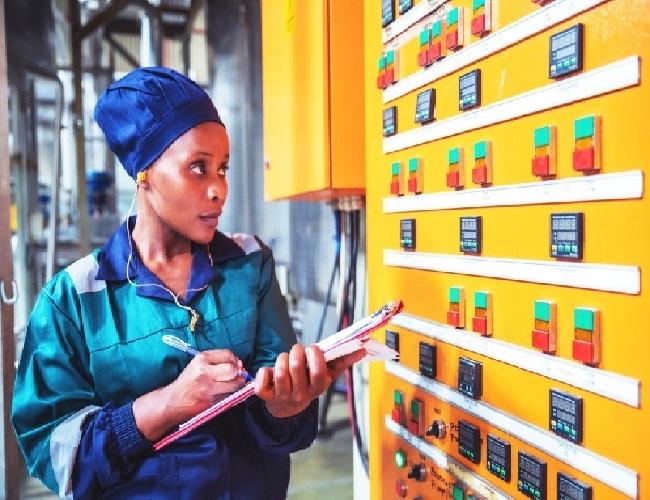Refrigeration Energy Audit Service
Best Refrigeration Energy Audit Service In Pune
Falcon Refrigeration Industry is the finest Refrigeration Energy Audit Service in Pune, offering the best in energy efficiency and cost savings. Our experienced professionals are dedicated to providing top-notch services to help you maximize the efficiency of your refrigeration system. With our advanced technology and expert advice, we can help you save money and reduce energy consumption.

Energy Audit Services determines the most effective and cost-effective means of reducing energy consumption. Commercial energy audits show how, where, and when electricity is consumed in a facility, as well as the systems and their users’ current and historical electricity prices. It presents a specific list of possible changes in technical and financial analysis that, if implemented, will lead to energy savings. Recommended changes are ranked based on trade-offs with financial and other related benefits.
Contact us today to get started on your Energy Audit and start saving! The refrigeration energy audit is a critical service for businesses that rely on refrigeration systems. Such as cold storage facilities, supermarkets, restaurants, and food processing plants. It involves a comprehensive assessment of the energy consumption of refrigeration. Systems and identifying areas for improvement to reduce energy costs and increase efficiency.
In Pune, there are many refrigeration Energy Audit Service providers. At our company, we take pride in being the best refrigeration energy audit service provider in Pune. Our team of experienced professionals has the knowledge and expertise to perform a thorough energy audit. Provide customized solutions to improve the efficiency of refrigeration systems. One of the key advantages of our refrigeration Energy Audit Service is that it helps businesses save money on energy costs.
By identifying areas of energy waste and implementing solutions to address them. We can help businesses reduce their energy bills significantly. Additionally, improving energy efficiency can also prolong the life of refrigeration systems. Reducing maintenance and replacement costs. Another advantage of our refrigeration energy audit service is that it helps businesses comply with environmental regulations. With increasing concerns about climate change and carbon emissions. Businesses must take steps to lessen their carbon footprint.
Our Energy Audit Service helps businesses identify areas of energy waste and provides solutions to reduce carbon emissions. Our refrigeration energy audit service involves a comprehensive assessment of refrigeration systems. Our professionals will evaluate the performance of the refrigeration equipment, insulation, refrigerant, and control systems. We use the latest tools and techniques to measure energy consumption. Identify areas for improvement. Based on the assessment, we provide a detailed report highlighting areas for improvement and recommendations for energy efficiency improvements.
One of the unique features of our refrigeration energy audit service. To meet our clients’ unique demands, we offer specialized solutions. We understand that every business has unique requirements and constraints. To create energy-efficient solutions that fit their demands and budget, we collaborate closely with our clients. Energy-efficient solutions may be designed and put into place thanks to the knowledge and expertise of our team of professionals. This can save energy expenditures greatly and increase the effectiveness of refrigeration systems.
In addition to our refrigeration Energy Audit Service. We also offer other energy-saving solutions. Such as LED lighting upgrades, HVAC optimization, and renewable energy solutions. We can assist companies in making even bigger energy savings and carbon footprint reductions by combining these solutions.
Energy Audit Priority Areas:
Optimizing operational efficiency of critical devices, processes, and procedures
A detailed analysis of the most critical devices, processes, and procedures is performed, each characterized by capacity, efficiency, and consumption it can be attached. Their contribution to a thriving system is compared to their loss. The cause of energy loss is identified and corrected without affecting power efficiency.
Minimizing Loss with Power Distribution Systems Extensive research has been conducted on power distribution systems with high-tech detection devices to detect leaks, pressures, and voltage drops. Once recognized, it is optimized to save multiple energy costs.
System Improvements (Energy Saving Surveys Are Usually Conducted According to State Government Standards).
Energy audit is the process of evaluating and analyzing the energy consumption of a building. Industry, or facility to identify opportunities for energy savings and efficiency improvements. During an energy audit, priority areas are identified. That can lead to significant energy and cost savings. Some of the top priorities that are frequently covered during an energy audit include the following:
- Lighting: In a structure or facility, lighting may use up a large amount of energy. During an energy audit, the lighting systems are evaluated to determine if they are using energy-efficient lighting fixtures, bulbs, and ballasts. Upgrading to more energy-efficient lighting can lead to significant energy savings. Another major energy consumer is buildings and facilities.
- HVAC systems are evaluated during an energy audit to identify opportunities for improving their efficiency. This includes evaluating the age and condition of equipment, assessing ductwork and insulation, and checking for air leaks and system controls.
- Building Envelope: The roof, walls, windows, and doors make up the building envelope. The building envelope is evaluated during an energy audit to determine if it is properly insulated and sealed. Upgrading insulation, sealing air leaks, and upgrading windows and doors can save energy.
- Equipment and Appliances: Items like computers, printers, and refrigerators. Are considered equipment and appliances. can be a substantial source of energy use in a structure or institution. During an energy audit, these items are evaluated to determine. If they are energy-efficient and if they can be upgraded to more efficient models.
- Process Energy: In industrial settings, the energy used for production processes can be a significant portion of overall energy consumption. During an energy audit, the energy used for production processes is evaluated to identify opportunities for improving efficiency.
Due feasibility of integrating renewable energy sources is evaluated during an energy audit
Energy Audit Needs :
In any industry, the top three operating costs are often energy (both electricity and heat), labor. Power, and material. When it comes to cost controllability or possible cost savings for each of the above components, energy is always at the top. Therefore, energy management capabilities are a strategic area for reducing costs. Energy audits help you understand how energy and fuel are used in each industry and help identify areas where waste can be generated and where there is room for improvement.
Energy Audit provides positive guidance on energy cost reduction, preventive maintenance, and quality control programs essential to production and utility activities. Such audit programs focus on fluctuations in energy costs, availability, and reliability of energy supplies, help determine the right energy mix, identify energy-saving technologies, and modify energy-saving systems.
In general, energy audits realize environmental protection ideas by providing technically feasible solutions with economic and other organizational considerations within a specific time frame. Energy audits are primarily used to identify strategies to reduce energy use per unit of product output or running costs. Energy audits provide a “benchmark” (reference point) for energy management within an organization and also provide a basis for planning more effective energy use throughout the organization.
Audit Process The first step in the audit process is to determine why the audit is being performed and the desired outcome. This is because everything else relies heavily on these answers. When it comes to rough energy consumption analysis, the process is relatively short and straightforward. Record nameplate data, make some measurements, record uptime, and compare calculated energy.
consumption to current invoices. This type of audit is very helpful in determining the percentage of the total energy used by lighting, HVAC systems, office equipment, manufacturing equipment, and cooling.
However, testing is much more complex and expensive when it comes to retrieving basic data for use in service contracts and determining the efficiency of cooling systems. In this case, with proper planning and preparation, you can save a lot of time and money and get more accurate and valuable information. The energy audit is the process of evaluating energy consumption. Identifying areas of energy waste, and providing recommendations for reducing energy consumption and increasing efficiency.
It is essential to conduct regular energy audits. lessen the negative effects of energy use on the environment, cut expenses, and increase energy efficiency. The primary objective of an energy audit is to identify opportunities for energy savings. Moreover, it may be carried out in a household, business, or industrial context. The energy audit process involves a detailed analysis. Energy consumption patterns and the identification of energy-saving opportunities.
There are several reasons why energy audits are necessary. The first reason is to save money on energy costs. Energy consumption can be a significant expense for homes and businesses. By identifying areas of energy waste and implementing energy-saving measures. Homeowners and business owners can reduce their energy bills. The second reason for conducting an energy audit is to reduce greenhouse gas emissions. Fossil fuel combustion for energy production contributes significantly to greenhouse gas emissions.
Which is a leading cause of climate change. By reducing energy consumption. Individuals as well as companies may lessen their carbon footprints and contribute to the fight against global warming. The third reason for conducting an energy audit is to improve the comfort and safety of homes and businesses. Inefficient heating, cooling, and ventilation systems. Can lead to uncomfortable living and working conditions, and can even be a safety hazard if left unaddressed.
There are several priority areas that energy audits focus on to identify energy-saving opportunities. The first area is lighting. Energy use in homes and workplaces may be significantly influenced by lighting. using energy-saving lighting techniques. LED lights, for instance, can lower energy usage and result in cost savings on energy bills. HVAC systems are essential for maintaining comfortable living and working conditions. Yet, they can also contribute significantly to energy waste.
Upgrading to energy-efficient HVAC systems or conducting regular maintenance on existing ones. Systems can significantly reduce energy consumption. The third priority area is building envelope. The building envelope includes walls, roofs, windows, and doors. Proper insulation and sealing of the building envelope can reduce energy waste by preventing heat loss in the winter and heat gain in the summer. The fourth priority area is appliances and electronics. Many household appliances and electronics consume energy even when they are not in use.
Switching to energy-efficient appliances and turning off electronics. When they are not in use can reduce energy consumption. In addition to these priority areas, energy audits also consider factors such as water consumption, renewable energy options, and behavior changes that can contribute to energy savings. Energy audits can be conducted by professionals or by homeowners and business owners themselves using energy auditing tools and resources available online. However, professional energy audits are recommended for more complex systems, such as HVAC systems or industrial settings.
Importance of Refrigeration Energy Audit
The cost of operating refrigeration systems is mostly driven by energy usage. It is essential to ensure that these systems. Are energy-efficient as a consequence in order to reduce energy consumption and operating costs. A refrigeration energy audit helps identify the areas where energy can be saved, thereby reducing operating costs and improving the overall efficiency of the system. In addition, it also helps in reducing the carbon footprint, making it an environmentally friendly process.
Process of Refrigeration Energy Audit
The stages below are typical for a refrigerator energy audit process:
- Data Collection: Information regarding the refrigeration system is collected as part of the audit process’s initial stage. This contains details about the equipment, such as the manufacturer and model, how old it is, and any maintenance history. It also includes data on the facility’s energy consumption and cost.
- Site Visit: A site visit is conducted to gather additional information about the refrigeration system. This includes identifying potential energy-saving opportunities, inspecting the equipment and controls, and checking for any leaks.
- Data Analysis: The data collected during the site visit is analyzed to identify areas where energy can be saved. This includes analyzing the energy consumption of each component of the refrigeration system.
- Recommendations: Based on the data analysis, recommendations. Are made for improving the energy efficiency of the refrigeration system. This includes recommendations for equipment upgrades. Maintenance practices, and control systems.
- Implementation: Once the recommendations are made, the implementation process begins. This involves installing energy-efficient equipment, upgrading controls, and making changes to maintenance practices.
- Follow-Up: After the implementation process is complete, a follow-up is conducted. Ensure that the energy-saving measures are working as intended. This includes monitoring energy consumption and identifying any additional areas for improvement.
Benefits of Refrigeration Energy Audit
The benefits of a refrigeration energy audit include:
- Reduced Operating Costs: By identifying areas where energy can be saved, a refrigeration energy audit helps reduce operating costs.
- Improved Energy Efficiency: By implementing energy-saving measures. The energy efficiency of the refrigeration system is improved. Resulting in reduced energy consumption and carbon emissions.
- Improved Equipment Life: By improving maintenance practices and upgrading equipment, the life of the refrigeration system is extended, reducing the need for replacement.
- Enhanced Comfort: An energy-efficient refrigeration system provides a more comfortable working environment for employees.
- Environmental Benefits: By reducing energy consumption and carbon emissions, a refrigeration energy audit helps reduce the environmental impact of the facility.

